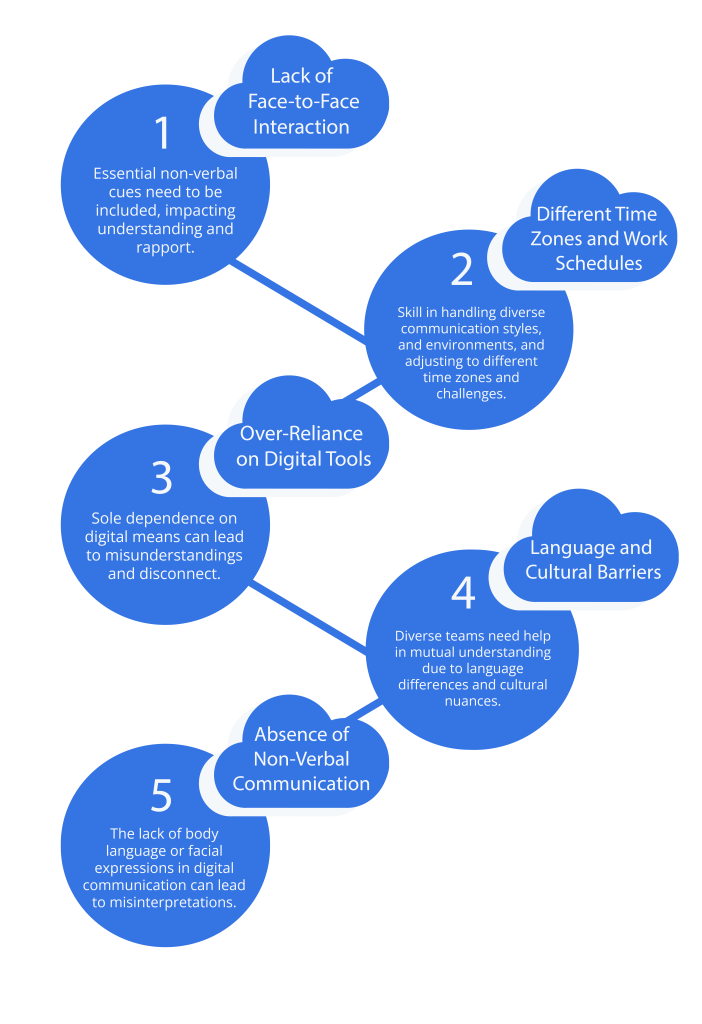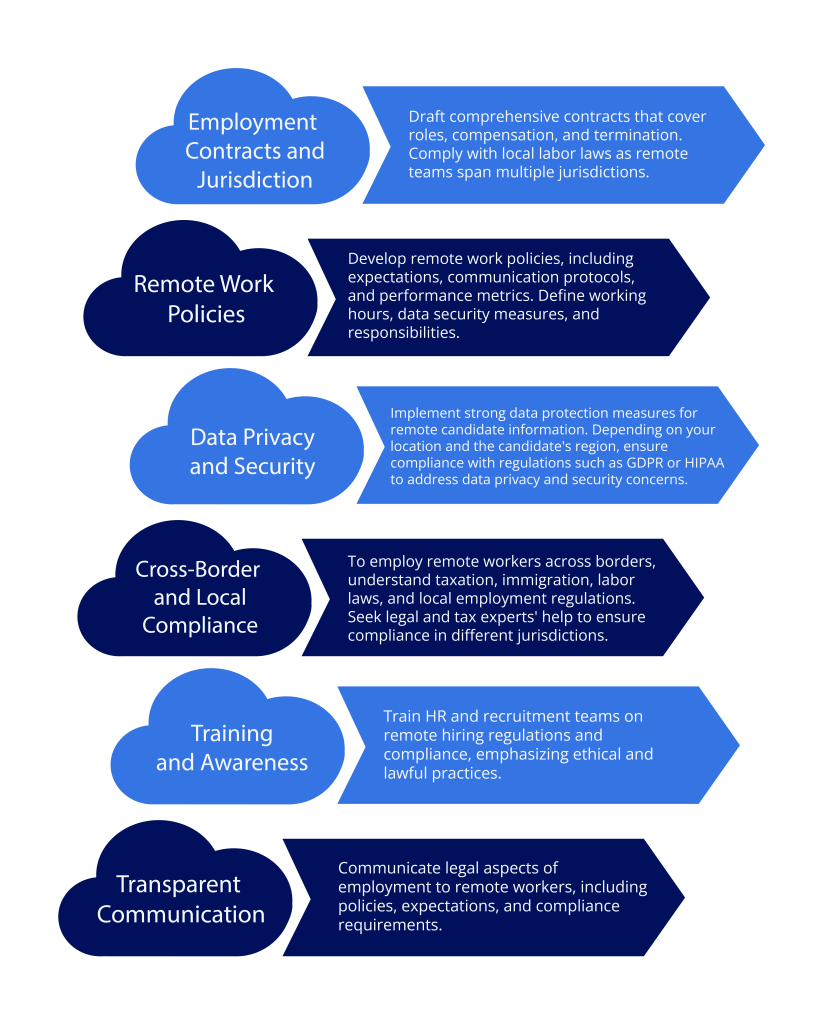The number of remote sales hiring has increased by 24% since 2021, making communication a significant challenge for businesses.
Remote work offers many benefits, including access to global talent, greater flexibility, and reduced commuting costs and time. However, it also presents unique obstacles, particularly in communication.
Managing sales teams remotely requires a different approach compared to traditional on-site employee management.
This blog article will discuss common communication challenges in remote settings and provide practical strategies to overcome them.
What Are the Common Communication Barriers in Remote Sales Hiring?
Communication in remote work settings differs from traditional office environments. Remote work provides flexibility and global collaboration but poses unique communication challenges.
Unlike in-person interactions, remote communication often relies on structured exchanges facilitated by technology.
Let’s explore the barriers:

How Can Technology Improve Remote Sales Hiring Communication?
In remote work, communication technology plays a crucial role.
In a Business Communication Report conducted by Project.co in 2022, it was found that there has been a significant shift in how employees communicate.
Online communication tools now surpass emails and face-to-face interactions, accounting for 45% of daily communication. This emphasizes the need for remote companies to adopt digital communication solutions.
Here are key ways technology can enhance remote sales hiring communication:
- Adopt Cloud Communication Platforms: Cloud solutions like Dialpad offer seamless global VoIP calling and integration with tools like Microsoft Teams, essential for streamlined communication and remote accessibility.
- Standardize Communication Tools: Using consistent tools like Zoom for video and Slack for chat enhances efficiency and prevents confusion in remote teams.
- Emphasize Video Conferencing: Video conferencing is essential for maintaining face-to-face interaction benefits and facilitating better communication, especially for detailed discussions and file sharing.
- Implement a Project Management System: Using tools like Asana helps remote teams collaborate effectively and stay updated without constant calls, maintaining a transparent workflow.
What Are the Best Practices for Remote Sales Interviewing?
Remote interviews have become a crucial aspect of hiring, and selecting the proper practices can significantly improve their efficiency and effectiveness.
Here are the top five best practices:
- Choosing the Right Video Interview Software: Video conferencing platforms like Zoom and Google Meet are essential for businesses. Familiarize yourself with features to make an informed decision.
- Standardizing the Remote Interview Process: Outline a standardized procedure for remote interviews. Provide interviewer and candidate contact information for consistency and efficiency.
- Preparing an Interview Procedures Document for Candidates: Provide candidates with a detailed itinerary of the interview process, including software instructions, estimated duration, preparation tips, and contact information for any technical issues.
- Structuring the Remote Interview Effectively: Prepare interview questions and itinerary in advance. Begin with small talk introductions and proceed with prepared questions. Allow time for the candidate to ask questions at the end.
- Troubleshooting Technical Issues in Advance: Ensure technical stability by checking the internet connection, conducting webcam and microphone tests, and closing unnecessary tabs before the interview to minimize disruptions.
How to Build a Remote-Friendly Company Culture?
Establishing a strong company culture for remote workers goes beyond connecting team members. It entails encouraging a sense of community and shared purpose despite geographical dispersion.
An influential, remote-friendly culture depends on transparency, collaboration, and the appropriate use of technology to ensure all team members feel valued and integrated.
Here are some steps to take in creating such a culture:
- Set Clear Expectations: Establish expectations for project timelines, work hours, and communication protocols. Each team member should understand their responsibilities well and the standards they are expected to meet.
- Host Regular Meetings: Utilize video conferencing for open and transparent communication. Regular meetings allow everyone to contribute and align with team goals and company values.
- Promote Collaboration: Implementing digital collaboration tools such as project management software and shared documents is crucial for effective teamwork, regardless of location.
- Recognize Achievements: Regularly celebrate team successes and acknowledge individual achievements. Recognition motivates team members and reinforces their commitment to the company’s goals.
- Organize Team-Building Activities: Host online games, virtual happy hours, and team challenges to foster a sense of community. These activities can help reduce feelings of isolation and reinforce company values.
- Empower Managers with Tools and Training: Managers can effectively and efficiently communicate with their remote team using automated workflow apps and employee productivity tools without micromanagement.
- Implement Feedback Mechanisms: Create a platform for remote workers to share feedback or report concerns, allowing anonymous responses to identify areas for improvement and stay connected to your workforce’s challenges.
Legal and Ethical Considerations in Remote Sales Hiring
As remote sales hiring becomes more common, companies need to navigate an increasingly complex legal and ethical landscape.
Remote sales hiring provides organizations access to talent from around the world, but it also raises various legal and compliance concerns.
To maintain legal compliance and integrity, it is crucial for organizations to ensure that their remote sales hiring processes comply with different laws and regulations.
Here are key considerations and strategies to address them:

Conclusion
With the rise of remote work, it is now more important than ever to handle remote recruitment effectively. The objective is to fill vacancies and create strong teams that can excel in a digital-first setting.
Companies must embrace this transition with the appropriate methods and resources to stay competitive and adaptable.
CloudTask’s Marketplace is a streamlined platform that helps businesses find qualified RevOps professionals to manage the intricacies of remote sales hiring and excel in this new era.
Ready to build your remote sales team? Dive into CloudTask’s Marketplace and discover a world of qualified candidates today!
Frequently Asked Questions (FAQs)
What are the main challenges in remote sales hiring communication?
- Challenges include lack of face-to-face interaction, time zone differences, reliance on digital communication tools, and language and cultural barriers, leading to misunderstandings.
How can a company build a remote-friendly culture?
- Establish clear expectations, use regular video meetings for transparency, embrace digital collaboration tools, recognize team achievements, and organize virtual team-building activities.
What legal and ethical considerations are crucial in remote sales hiring?
- Key considerations include creating comprehensive employment contracts, ensuring data privacy, understanding cross-border and local labor laws, and maintaining transparent communication with remote employees.








